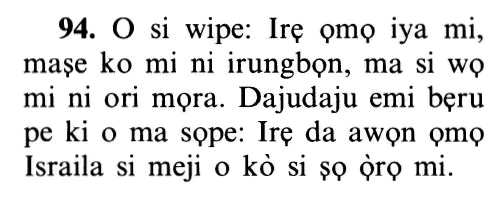20vs94
Select any filter and click on Go! to see results
قَالَ يَا ابْنَ أُمَّ لَا تَأْخُذْ بِلِحْيَتِي وَلَا بِرَأْسِي إِنِّي خَشِيتُ أَن تَقُولَ فَرَّقْتَ بَيْنَ بَنِي إِسْرَائِيلَ وَلَمْ تَرْقُبْ قَوْلِي
Qala ya bna omma la takhuth bilihyatee wala birasee innee khasheetu an taqoola farraqta bayna banee israeela walam tarqub qawlee
Index Terms
Click to play
Yoruba Translation

Hausa Translation
(Hãrũna) ya ce: "Yã ɗãn´uwãna! Kada ka yi kãmu ga għmũna kõ ga kaina. Lalle nĩ, nã ji tsõron ka ce: Ka rarraba a tsakãnin Banĩ Isrã´ĩla kuma ba ka tsare maganata ba."
Asbabu n-Nuzuul (Occasions of Revelation)
قَالَ يَبْنَؤُُمَّ ...
He (Harun) said: "O son of my mother!''
This mentioning of the mother was Harun's attempt to soften Musa's anger, because he was Musa's biological brother and they had the same parents. The mentioning of the mother here is more delicate and profound in bringing about gentleness and mildness. This is why he said,
... يَبْنَؤُُمَّ لَا تَأْخُذْ بِلِحْيَتِي وَلَا بِرَأْسِي ...
O son of my mother! Seize (me) not by my beard, nor by my head!
This was Harun's excuse to Musa for being delayed from coming to him and informing him of the great mishap that took place.
He said,
... إِنِّي خَشِيتُ ...
Verily, I feared,
meaning, "I was afraid to come after you and inform you of this, because I thought you might accuse me of leaving them alone and causing division between them.''
... أَن تَقُولَ فَرَّقْتَ بَيْنَ بَنِي إِسْرَائِيلَ ...
lest you should say: `You have caused a division among the Children of Israel,
... وَلَمْ تَرْقُبْ قَوْلِي ﴿٩٤﴾
and you have not respected my word!
This means, "And you did not take care of what I commanded you to do when I left you in charge of them.''
Ibn Abbas said,
"Harun was respectful and obedient to Musa.''
يخبر تعالى عن موسى عليه السلام حين رجع إلى قومه فرأى ما قد حدث فيهم من الأمر العظيم فامتلأ عند ذلك غضبا وألقى ما كان في يده من الألواح الإلهية وأخذ برأس أخيه يجره إليه وقد قدمنا في سورة الأعراف بسط ذلك وذكرنا هناك حديث " ليس الخبر كالمعاينة " وشرع يلوم أخاه هارون فقال ما منعك إذ رأيتهم ضلوا ألا تتبعني أي فتخبرني بهذا الأمر أول ما وقع أفعصيت أمري أي فيما كنت قدمت إليك وهو قوله اخلفني في قومي وأصلح ولا تتبع سبيل المفسدين قال يا ابن أم ترفق له بذكر الأم مع أنه شقيقه لأبويه لأن ذكر الأم هاهنا أرق وأبلغ في الحنو والعطف ولهذا قال يا ابن أم لا تأخذ بلحيتي ولا برأسي الآية. هذا اعتذار من هارون عند موسى في سبب تأخره عنه حيث لم يلحقه فيخبره بما كان من هذا الخطب الجسيم قال إني خشيت أن أتبعك فأخبرك بهذا فتقول لي لم تركتهم وحدهم وفرقت بينهم ولم ترقب قولي أي وما راعيت ما أمرتك به حيث استخلفتك فيهم قال ابن عباس وكان هارون هائبا مطيعا له .
"قال" هارون "يبنؤم" بكسر الميم وفتحها أراد أمي وذكرها أعطف لقلبه "لا تأخذ بلحيتي" وكان أخذها بشماله "ولا برأسي" وكان أخذ شعره بيمينه غضبا "إني خشيت" لو اتبعتك ولا بد أن يتبعني جمع ممن لم يعبدوا العجل "أن تقول فرقت بين بني إسرائيل" وتغضب علي "ولم ترقب" تنتظر "قولي" فيما رأيته في ذلك
ابن عباس : أخذ شعره بيمينه ولحيته بيساره ; لأن الغيرة في الله ملكته ; أي لا تفعل هذا فيتوهموا أنه منك استخفاف أو عقوبة . وقد وقيل : إن موسى عليه السلام إنما فعل هذا على غير استخفاف ولا عقوبة كما يأخذ الإنسان بلحية نفسه . وقد مضى هذا في " الأعراف " مستوفى والله عز وجل أعلم بما أراد نبيه عليه السلام
